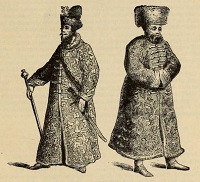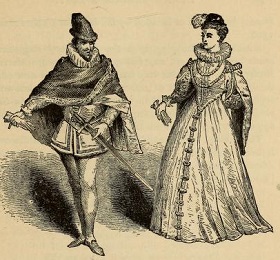| directory |
| home | contact |
|
|||||||||||||||
| search | |||||||||||||||
Love's Labour's Lost: Dramatis PersonaePlease see Shakespeare's Characters A to Z for a complete pronunciation guide.Ferdinand, King of Navarre Biron, Longaville, Dumaine, three Lords attending upon the King Boyet, Marcade, Lords attending upon the Princess of France Don Adriano de Armado, a fantastical Spaniard Nathaniel, a curate Dull, a constable Holofernes, a schoolmaster Costard, a clown Moth, Page to Don Adriano A Forester Princess of France Rosaline, Maria, Katharine, ladies attending upon the Princess Jaquenetta, a country wench Officers and Other Attendants upon the King and Princess Scene: Navarre Next: Love's Labour's Lost, Act 1, Scene 1 The Title of the Play. — Mason says: "I believe the title of this play should be Love's Labours Lost" and Mr. Furnivall...agrees with him. The title-pages of the quartos give "Loues labors lost" and "Loues Labours lost;" but the running title of the quartos and 1st and 2d folios is "Loues Labour's Lost," which is clearly a contraction of "Love's Labour is Lost." In the early eds. the possessive case is commonly given without the apostrophe (as in the titles " A Midsommer nights Dreame" and "The Winters Tale"); but the contraction of is generally has the apostrophe (as in "All's Well that ends Well"). Meres calls the play "Loue labors lost," and Tofte "Loues Labour Lost." We prefer to follow the folio rather than the quarto, which is not consistent with itself. In the quartos the play is not divided into acts or scenes. In the folio it is divided into acts of very unequal length, "the first being half as long again, the fourth twice as long, the fifth three times as long, as the second and third" (Spedding). Dramatis Persons. — In the quartos and the folio (cf. Oth. p. 153) no list of dramatis persona is given.  Biron is spelt "Berowne," and in iv. 3. 227 it rhymes with "moon." W[hite]. spells it "Birone." Mercade appears as "Marcade" in the quartos and 1st folio, and Armado is sometimes "Armatho." W. thinks that Moth should be printed "Mote," as it was clearly so pronounced. ... In i. 2. 85 of the present play, in "She
had a green wit" there is probably an allusion to the "green withes" used in binding Samson. Boyet rhymes with debt in v. 2. 336; Longaville with ill in iv. 3. 118, and with mile, in v. 2. 53; and Rosaline with thine in iv. 3. 216. Costard, in the old stage-directions, is called "Clown." Biron is spelt "Berowne," and in iv. 3. 227 it rhymes with "moon." W[hite]. spells it "Birone." Mercade appears as "Marcade" in the quartos and 1st folio, and Armado is sometimes "Armatho." W. thinks that Moth should be printed "Mote," as it was clearly so pronounced. ... In i. 2. 85 of the present play, in "She
had a green wit" there is probably an allusion to the "green withes" used in binding Samson. Boyet rhymes with debt in v. 2. 336; Longaville with ill in iv. 3. 118, and with mile, in v. 2. 53; and Rosaline with thine in iv. 3. 216. Costard, in the old stage-directions, is called "Clown."
Costume. — As K[night]. remarks, Cesare Vecellio, in his Habiti Antichi (ed. 1598), gives us the general costume of Navarre at this period. We are told that some dressed in imitation of the French, and some in the style of the Spaniards, while others blended the fashions of both these nations. The cut [above] is from Vecellio, and shows the Spanish gentleman and the French lady of 1589. For the costume of the Muscovites in the masque, see [left]. Abbreviations Used in the Notes Abbott (or Gr.), Abbott's Shakespearian Grammar (third edition). A. S., Anglo-Saxon. A. V., Authorized Version of the Bible (1611). B. and F., Beaumont and Fletcher. B. J., Ben Jonson. Camb. ed., "Cambridge edition" of Shakespeare, edited by Clark and Wright. Cf. (confer), compare. Clarke, "Cassell's Illustrated Shakespeare," edited by Charles and Mary CowdenClarke (London, n. d.). Coll., Collier (second edition). Coll. MS., Manuscript Corrections of Second Folio, edited by Collier. D., Dyce (second edition). H., Hudson ("Harvard" edition). Halliwell, J. O. Halliwell (folio ed. of Shakespeare). Id. (idem), the same. K., Knight (second edition). Nares, Glossary, edited by Halliwell and Wright (London, 1859). Prol., Prologue. S., Shakespeare. Schmidt, A. Schmidt's Shakespeare-Lexicon (Berlin, 1S74). Sr., Singer. St., Staunton. Theo., Theobald. V., Verplanck. W., R. Grant White. Walker, Wm. Sidney Walker's Critical Examination of the Text of Shakespeare (London, 1860). Warb., Warburton. Wb., Webster's Dictionary (revised quarto edition of 1879). Wore, Worcester's Dictionary (quarto edition). The abbreviation; of the names of Shakespeare's Plays will be readily understood; as T. N. for Twelfth Night, Cor. for Coriolanus, 3 Hen. VI. for The Third Part of King Henry the Sixth, etc. P. P. refers to The Passionate Pilgrim; V. and A. to Venus and Adonis; L. C. to Lover's Complaint; and Sonn. to the Sonnets. When the abbreviation of the name of a play is followed by a reference to page, Rolfe's edition of the play is meant. The numbers of the lines (except for the present play) are those of the "Globe" ed. _____ How to cite the explanatory notes:_____ |

More to Explore |
©1999-2021 Shakespeare Online. All Rights Reserved.